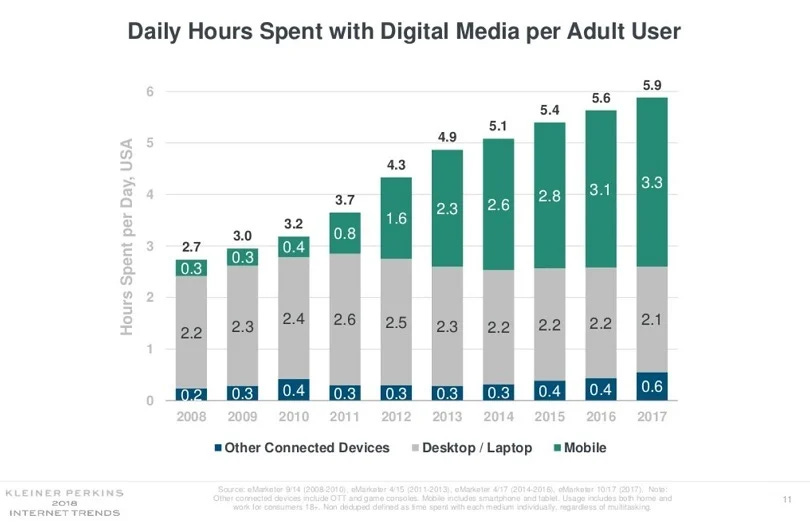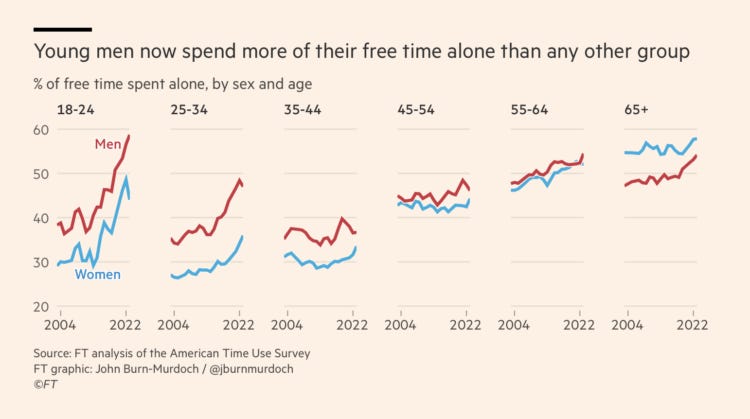"Will AI be as big of a catalyst for a consumer AI wave as mobile?"
One of the questions I hear a lot is "will AI be as big of a catalyst for a consumer AI wave as mobile?"
It’s a narrow question, but still an interesting one to think through. There were three elements at play with mobile:
1. Mobile enabled a dramatic expansion in internet minutes that were up for grabs. Rather than the zero-sum game of fighting for the limited time people spent in front of a desktop computer, suddenly there were all these new minutes up for grabs -- when someone was commuting, waiting in line, on the toilet, etc. This is why the consumer mobile wave was biased towards a particular set of players: those that offered more dopamine per minute by connecting to the internet than staying in the analog world.

2. Mobile introduced new ingredients with which a consumer founder could build (multiple cameras, GPS chip, accelerometer), creating greenfield opportunities for startups.
3. The AppStore dramatically reduced the friction of installing a new application, making it easier for people to download apps to their heart's content.
Now let's do a thought experiment:
If we didn't have (2), and we had these powerful computers in our pockets *without* any cameras/GPS/etc, would mobile have still been a huge catalyst for consumer startups? Definitely. True, we wouldn't have had Uber, Instagram, Snap, or TikTok, but apps like FB, WhatsApp, Twitter, LinkedIn, Pinterest, Reddit, Airbnb, YouTube, etc. would still be the dominant players they are today.
What if we didn't have (3)? I think consumer internet would have been fine -- the motivation was so strong. And the friction would have gotten ironed out over time.
But for (1), what if we held the # of minutes a person could spend online constant pre-mobile vs post? Instead of the almost seven hours we now spend on our devices, you’d have companies fighting for ~2hrs of daily internet time. This would definitely have tempered the magnitude of the mobile consumer internet wave.
Implications on Consumer AI
If we take this thought experiment back to AI consumer apps, there are broadly two categories of AI consumer apps: There are going to be those that will orient towards consumer attention, and those that will use AI as more of an enabling technology for a utility (think Google Maps or Uber in the mobile era). The mobile era saw an explosion of startups going after both categories. How about the consumer AI era?
Let’s start with the first category: AI apps that orient towards consumer attention. Here, the question comes down to how much AI is able to expand the # of minutes we spend connected digitally, and then what % of existing digital minutes AI can cannibalize.
For example:
You can engage with an AI friend or romantic partner instead of a real life friends / romantic partners.
You can talk to your AI / AI friend / AI therapist / AI cooking coach / etc while you are cleaning the house, prepping dinner, walking your dog, commuting, instead of listening to music / podcast / radio, watching TV, etc. (Related post: A framework for consumer attention. Voice AI is a “liquid”.)
The education use cases are obvious for younger people — AI will be a constant companion through school work.
You might have more leisure time in a world where AI means you need to work less. etc.
(As an aside: Yes of course, there are COUNTLESS use cases where you will use AI during the day to accomplish work, but I’m focused here on the strictly consumer use cases.)
In a way, the success of the consumer internet (including gaming) has created the conditions for one of the biggest AI consumer opportunities: loneliness.
Still, this isn’t like the mobile era where the dopamine maximizing drive of consumers made changing behavior easy. An AI friend has to compete for time against the dopamine optimized torrent of TikTok et al (which will all be taking advantage of LLMs in their own way to further optimize engagement), whereas when Instagram was ascendent, it was mostly competing with the unoptimized analog world. Earning a minute today is a way harder battle to win than it was in the early days of mobile.
Don’t get me wrong: AI will win a lot of consumer minutes (maybe too many, if you think about the importance of human-to-human connection), but it won’t be the same magnitude as the minute land-grab of the mobile era… until we have new AI-native devices or neural implants that will once again dramatically expand the amount of time we connect digitally. So by this measure, the consumer AI wave should be smaller than the mobile wave.
But consumer minutes is not the only battleground. There will be countless consumer AI companies that emerge that are more akin to Uber or Google Maps: companies that take advantage of AI to make consumer’s lives easier or give consumers new superpowers (think companies like Manus* or Lovable). In other words, consumer AI companies that are more about (2) than (1). I think this will be more of the battleground for consumer AI startups, at least in terms of quantity of companies.
It won’t be easy, and as I’ll write about next, we’re early in the wave. But get ready. We’re in for a lot of change.
If you are building on the frontier of consumer AI, I'd love to hear from you. My email remains Sarah at benchmark dot com.
*A Benchmark portfolio company.


meant to comment this but emailed ahah
Mobile, as a wave, was a distribution rail. Hence increased the availability of experiences leading to more time spent.
AI has no such effect (maybe Siri like AI) - because it is purely a capability
Just wrote about this today so could not resist asking ahah
Really great write up. The utility of a technology always comes first, then the minutes. At least that was how it plays out every time.